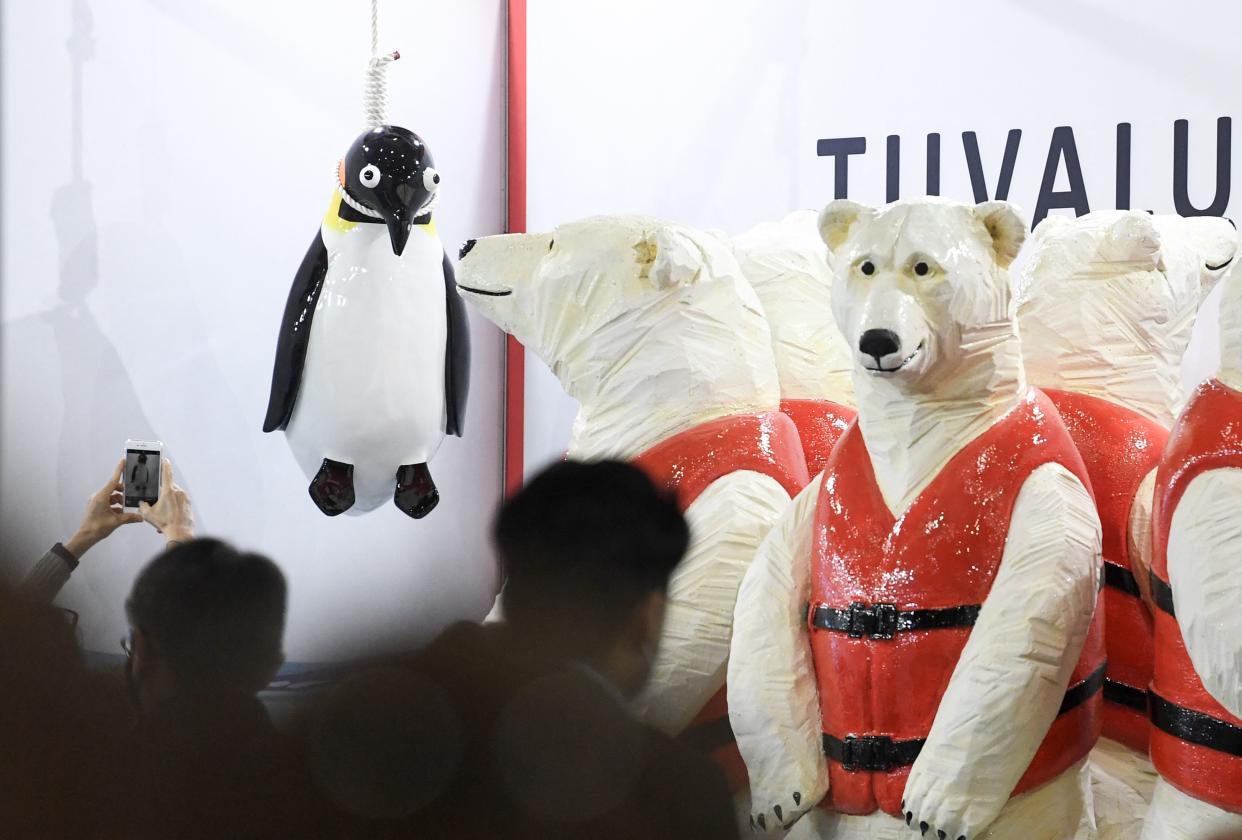'Tuvalu is sinking': Island nation threatened by sea level rise looks for salvation
GLASGOW, Scotland — “Tuvalu is sinking,” Finance Minister Seve Paeniu proclaims of his island nation as he sits down for an interview with Yahoo News at the U.N. Climate Change Conference.
With a population of just over 11,000 residents, Tuvalu is an idyllic South Pacific atoll consisting of nine low-lying islands whose highest elevation is roughly 15 feet. Thanks to sea level rise, each year that elevation shrinks a little bit more.
“We are now living the climate change in Tuvalu, we are seeing land fast disappearing,” says Paeniu, who emits an intensity with his bald head and piercing stare.
“That’s why we are here at COP26,” he says of the climate conference, “to tell our story to the world. The world needs to take action now, not to defer it to later years.”
Paeniu, 56, has seen firsthand how rising seas have begun eating away at his homeland.
“There’s inundation. Water’s just infiltrating the water links below the land, places where water doesn’t come through now is all flooded. There are storm surges when there are cyclones that just come and wash right across the whole land. ... Never that happened before,” Paeniu says. “We have land territory being submerged or disappearing where there used to be vegetation and agriculture.”

With no rivers or wells for fresh water, the residents of Tuvalu must collect rain for drinking water or import diesel desalination plants, though the latter solution is expensive. As the ocean waters have advanced, agriculture has been made more precarious, and once-abundant fishing has also begun to turn.
“Food security has been severely threatened, and even our fisheries,” Paeniu says. “We see coral bleaching, acidification of the sea water, that’s now affecting our food supply.”
To make matters worse, tropical cyclones have been growing more powerful, thanks to rising land and ocean temperatures, leaving Tuvalu and other island nations at heightened risk.
“[Cyclone Tino] struck us in January of 2020, a Category 4 cyclone that was quite severe,” Paeniu says. “For houses that didn’t have stilts, the water just washes across those houses, so they lost their homes, their personal, private belongings. It also destroyed our stable root crop, which is swamp taro. They took out vegetation, so sea water just got into it, just destroyed the entire crop.”
Of the many risks that climate change represents for humanity, those faced by island nations are perhaps the most easily understood. And they are also among the most urgent.
“Islands are the canary in the coal mine in this situation,” former President Barack Obama said in a Monday speech at COP26. “They are sending a message now that if we don’t act — and act boldly — it’s going to be too late.”

Before his remarks, Obama had attended a session on island resilience and met with representatives from Fiji, the Marshall Islands and Grenada. Tuvalu’s Foreign Minister Simon Kofe filmed a message for the conference that he delivered while standing knee-deep in sea water to better illustrate the threat his nation faces.
It's going to take a lot to make your message stand out at #COP26 So we took an innovative approach. In a pre-recorded statement shot by public broadcaster TVBC, Foreign Minister Simon Kofe addressed cameras while knee-deep in the ocean.https://t.co/k3eHNF2ej6
— Tuvalu Department of Trade (@TuvaluTrade) November 8, 2021
While Paeniu says the residents of Tuvalu don’t want to leave their homeland, that has become a regular topic of conversation in the last few years.
“The government of Tuvalu is not actively encouraging people to migrate — that’s a quite clear policy direction. However, the government is facilitating and providing opportunities for people who chose to migrate out of Tuvalu because of the climate change impacts,” he says. “There are worker schemes, migrant worker schemes with Australia and New Zealand, where our people could go on short-term employment contracts. We are working on an initiative that eventually will be brought up within the U.N. system where if everything fails and Tuvalu becomes uninhabitable, obviously there’s nowhere to go, so we will need to relocate.”
Scientist Benjamin Strauss told “The Climate Crisis Podcast” that thanks to the amount of greenhouse gas emissions that humans have added to the atmosphere since the start of the Industrial Revolution, the planet is all but guaranteed to see 5 feet of sea level rise in the coming decades.

If that prediction holds true, it would be the end of Tuvalu as we know it.
“We know that even if we were to reach the 1.5 [degree Celsius of warming] target at this COP, that won’t prevent Tuvalu from land disappearing or sinking,” Paeniu says. “So our key message is for countries to help us, prevent us from being submerged. For that we would like to undertake an ambitious, raised land reclamation program.”
That idea means following the lead of the Maldives and China, which have begun pumping massive amounts of sand on top of coral reefs to reverse the assault of sea level rise on island outposts.
“It is a viable project,” Paeniu says of the expensive, and perhaps temporary, solution. “Part of our expectation at the COP is to ensure that whatever climate finance is agreed [upon], it could provide funding for such an ambitious program.”
It’s unclear whether Tuvalu will be able to convince wealthy nations to contribute to the effort to save it from the advancing ocean. But what isn’t in doubt is that there is a deep connection between its population and what remains of the atoll.
“We do not want to leave or relocate or migrate away from Tuvalu, because that is part of our culture, our identity, our heritage. We are working on amending our constitution to ensure the permanency of statehood, Tuvalu statehood, in maritime boundaries regardless of the effect of sea level rise,” Paeniu says, adding, “We hope that could be a platform for setting a new precedent under international law, so that whatever happens due to the impact of sea level rise, Tuvalu can still claim its sovereignty.”
____
Read more from Yahoo News:


